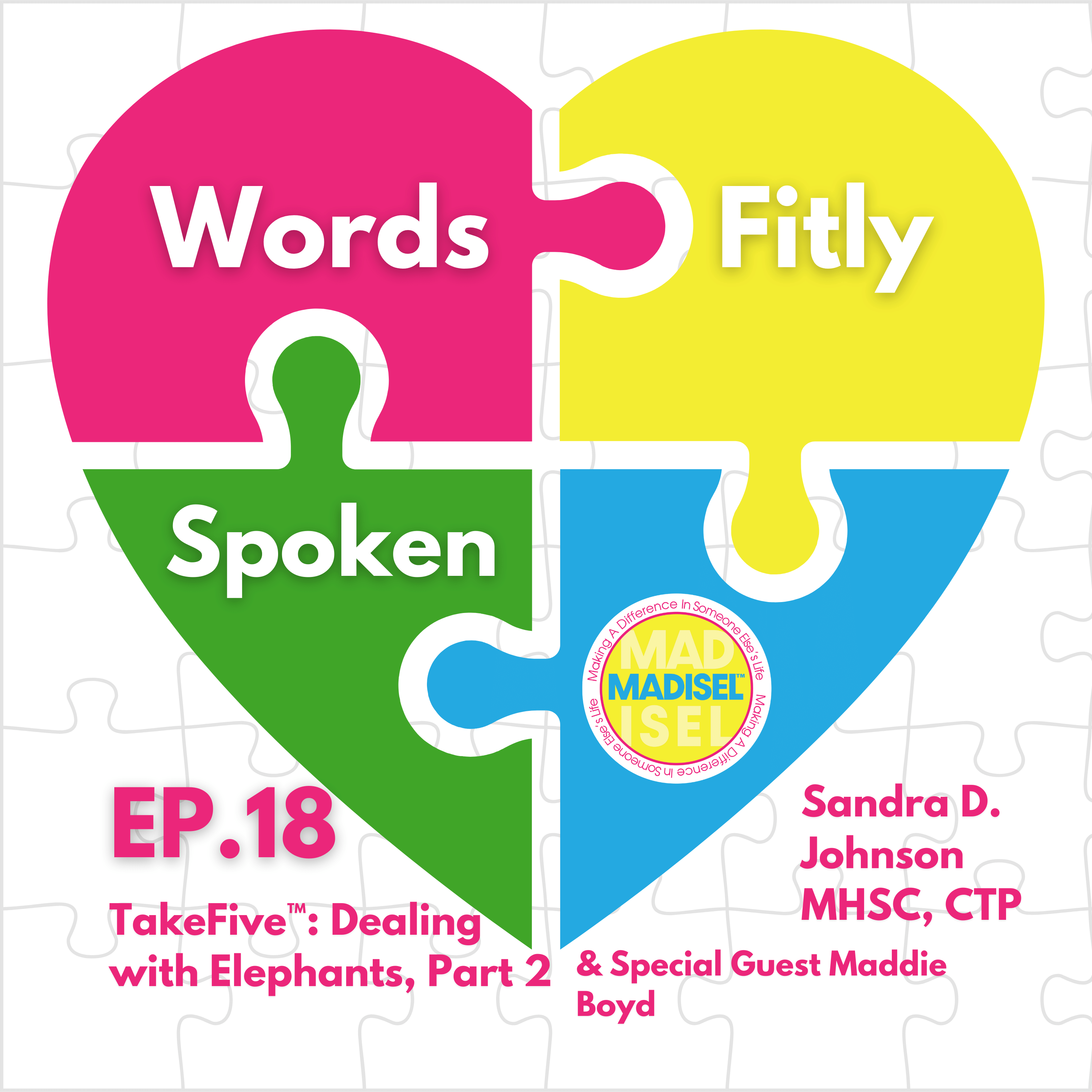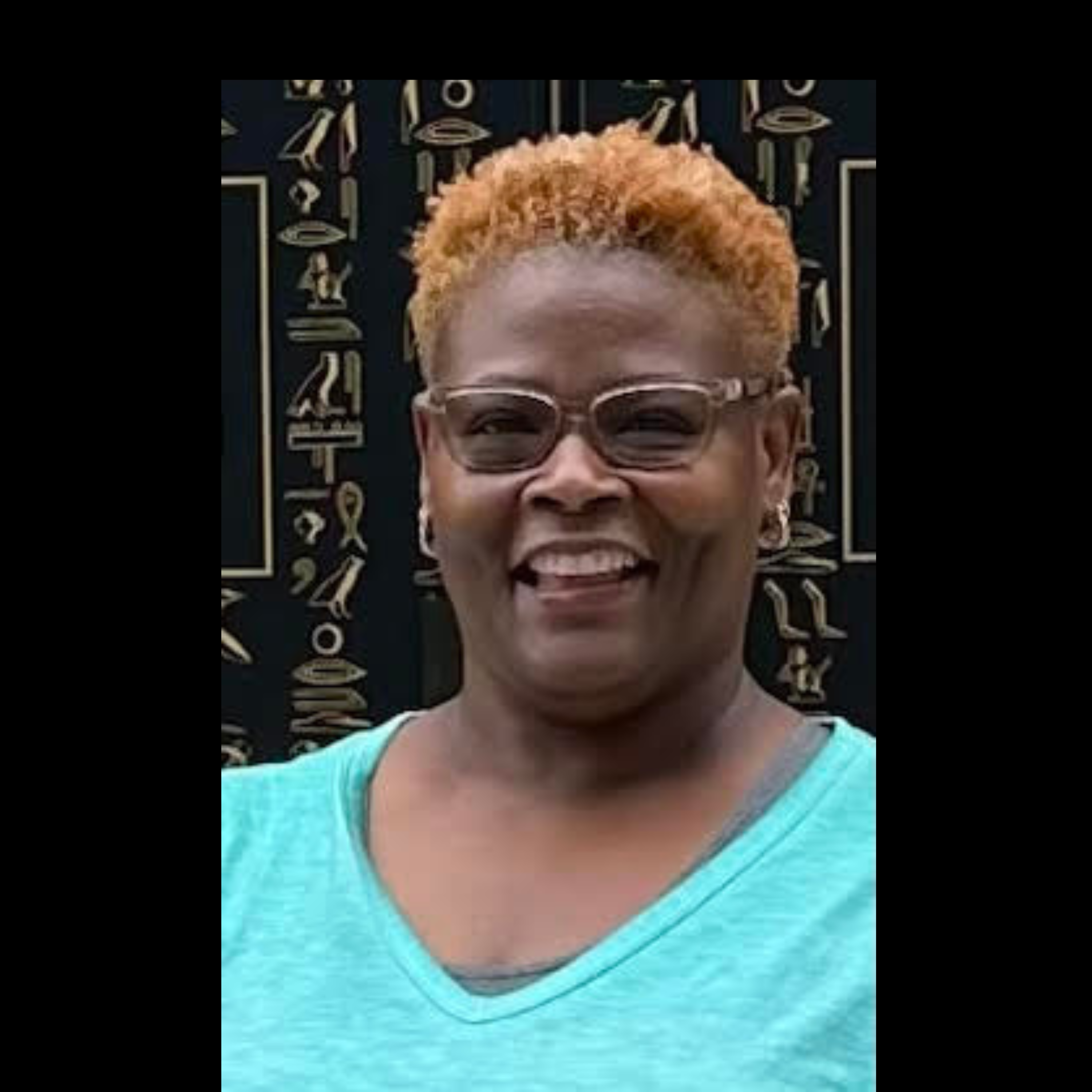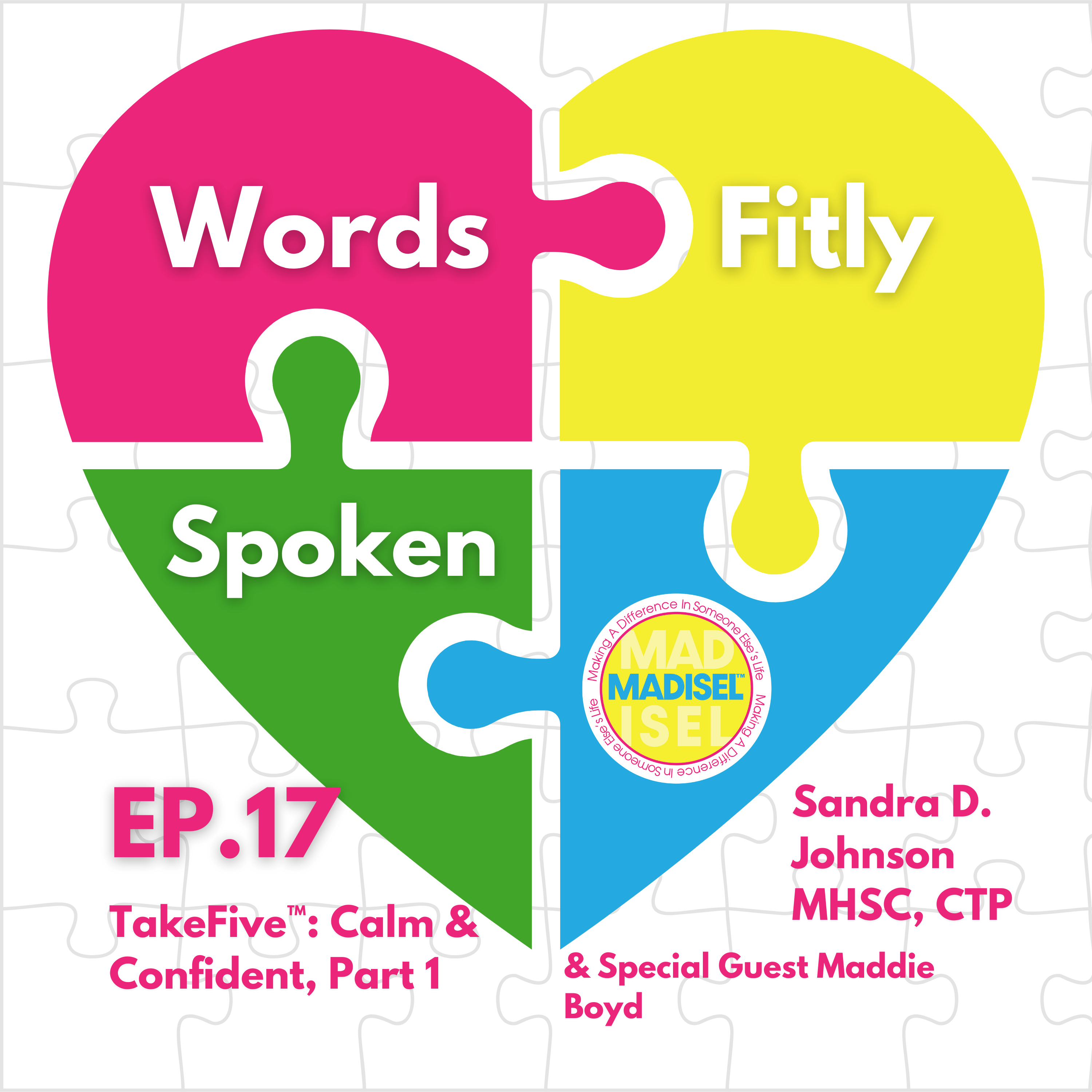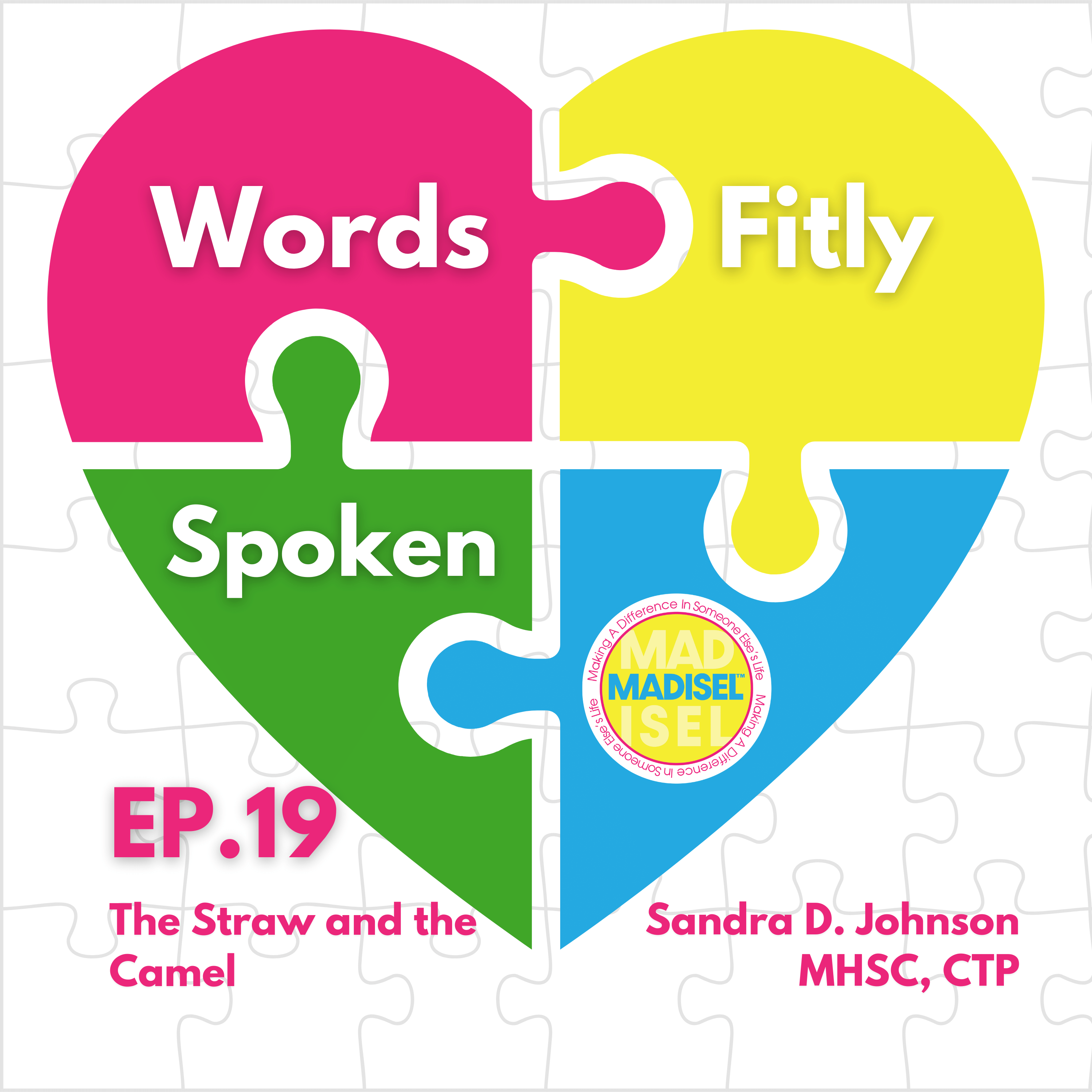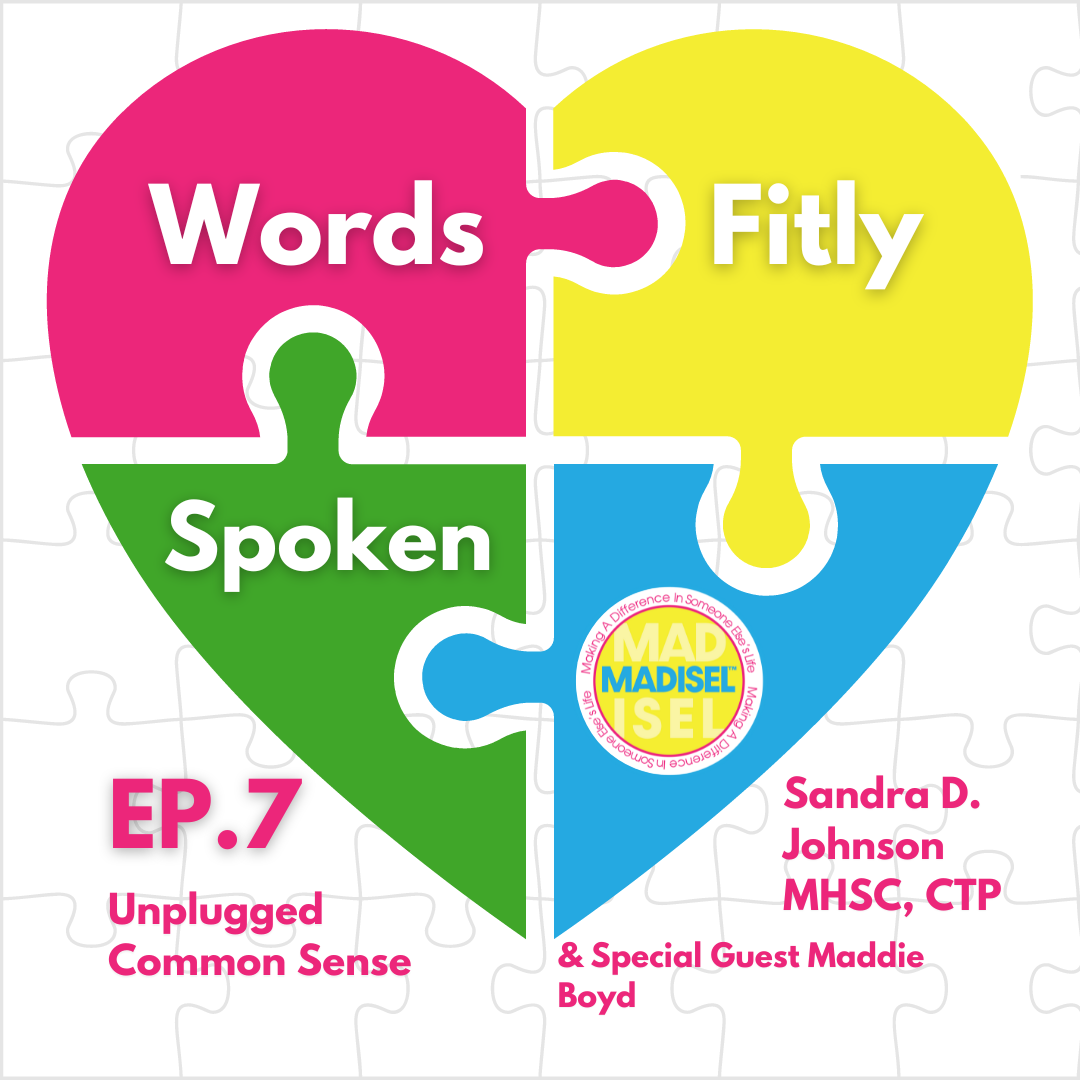Coach Sandra and Intern Maddie go deeper into the TakeFive™ conversation to unpack the remainder of the topics. There are some powerful comments spoken in this episode that will inspire the listeners to go deeper into their relational conversations and connections. A special thanks to Maddie Boyd for sharing her perspectives on this episode.
View Full Transcript
Episode Transcript
Welcome to at MADISEL Coach and MADISEL TV's Words Fitly Spoken podcast. Hello there. I'm Coach Sandra, and I'm the host of Words Fitly Spoken podcast. Words Fitly spoken are words spoken at the right time for your encouragement and enrichment. On this podcast, we will deal with emotional and mental wellness by talking about the conflict We have in our everyday relationships, whether at home, work, school, and the community. Stop in to hear some helpful words that create awareness about your emotional health.
Welcome, welcome, welcome back in to Words Fitly Spoken, the podcast dealing with emotional and mental health support. So as we talk about take five, we're going to introduce you to these five things and they are practice stillness. Find your calm, check your confidence. What do we want to do fourth? Fourth, we want to have trust in our relationships.
Ooh, the T word. And ourselves. Oh, relationship and self trust. Excellent. So, why would trust be such a major thing for my, why is it important for my emotional health? If you don't trust your surroundings, if you don't trust the people that you are with, You're constantly going to be on guard. You never feel safe.
You never feel like you can just take a breath and settle down and truly be able to work on these things like we're talking about, because you're constantly battling this inner voice that's saying you're in danger and you can't relax. And that is so hard to be able to work on anything else when your brain is completely occupied with not trusting anything around you, not trusting your environment, parents, friends, school, whatever it is.
If we don't have that in our environment, we truly can't get to the root of, you know, why these miscommunications are, why these messy conversations are happening. That's good. Excellent. Excellent. Um, yeah, trust is major. It is a major piece. And like we were talking about as Maddie's sharing, I'm thinking about confidence the whole time when you're talking about trust.
So when our confidence is fragile, our trust is going to be little to nothing. Yeah. So Yeah. Each one of us have to examine what is going on in that trust relationship. Now, trust is not a given. I think sometimes we put people in situations to where you have to trust me. No, we don't. We don't. And, and so sometimes we go through the piece too of saying, you know, trust is earned and all of these things and we work on it, right?
We need to be willing to work on it. Each one of us, we have to have people we trust. We have to be able to trust ourselves. Am I always making the right decision for me? No. Sometimes, uh, I'm not thinking clearly about what happens because the decision I make for me does affect maybe Maddie at some point or another, right?
Because trust of myself does, in fact, my environment as well and the people around me. So just as I think that confidence is a renewable energy trust has its own particulars about it. It is a very interesting thing that is not a guarantee. Um, it's not old to us either. I think sometimes that happens where we will get into situations.
Well, Why wouldn't you trust me? You know, I never failed you. I never, well, we each, we're dealing with things and, and finding different stages of our relationship. So right now, um, maybe because of a conflict, say that Maddie and I are having, we decide to work on it. We believe the relationship's worth it.
I'm not going to go to 120 percent trust of Maddie. No, it's going to, it takes, I'm going to go to bite size pieces. Now it might be 30 percent for me and she might go to her section of trust. It might be 40 to 60. Yeah. Right. Or she may want to start at five. She does not have to do trust the same way I do trust.
Absolutely. A lot of times we think that right. Oh, well, I trust you. So you should trust me. That's not a given. We have to stop putting people in situations so that we can be in control. Yeah, I think that's a really good point because you and I haven't had the same experiences with trust. And so, another thing that I think, parents don't really understand why their kids won't immediately trust them.
Because they're not really looking at their own actions. Okay. What have you, what have I shown my child to not trust me? That's good. And I think that's really hard to, you know, delve into yourself like that. Mm hmm. But as a parent, if your child isn't trusting you, there was probably a reason why.
Something they saw, heard, you know, an experience that they had, that is making them not be able to trust you, not tell you things, you know, things like that. And I think that that… In the family life is something that is like really, really needed is, you know, trust between the parent and the child.
Absolutely. And I love that you bring it up and the way you bring it up, because it's still, it goes right back to that place of saying, we just assume because you trusted me as a toddler, you're going to trust me at 14. Yeah. Nope. They've transitioned from a toddler. They're no longer a toddler. They're now 14 and the trust.
Fade it, simply going in and saying, a parent can do this if you really want to work on real relationships. I'm going to go and I'm going to ask my 14 year old, is there something that you can identify that happened in our relationship that caused you not to trust me as much? Don't go threatening. Just go with the curiosity.
Hey, is there something that happened? Did I do something? Did I say something? Sometimes it's a misunderstanding, but because it's never talked about, it's never resolved. Yeah. And so that trust is thinner and thinner and thinner as that young person gets older. Mm hmm. And then, in a lot of situations, the relationship's completely broken.
Mm hmm. Because we never talked about the lack of trust. Yeah. We never stopped to deal with it. So dealing with it, asking questions, being teachable. So the parent, the adult teacher, um, whether you're a parent, those who work with young people in crisis, we gotta be willing to grow too, right? I gotta be willing to ask myself, is the relationship important?
And if it is important because it is important, I'm going to do whatever I need to do, which means being uncomfortable. Asking that tough question. What is it that you think happened? Sometimes it's a misunderstanding. Sometimes it's I'm with some friends and my friends, they don't trust their parents. So I think I'm not supposed to trust mine.
It could be anything, right? It could be, you know, you, you told me to be nice to people. Um, no matter where we're at, but we were out at the restaurant that one day and you were so rude. And your rudeness toward that waitress just really turned me off. I felt like you have two faces and I don't want to deal with you with two faces.
Yeah, absolutely. And it could be something like that where you did something. Hey, and something like that, Maddie, you can fix that. You can fix it. You can admit you were wrong. You can even go back to the restaurant, find that waitress and say, I was rude. I was disrespectful to you. Yeah. And let your daughter or your son or whoever see that.
Oh, some people might feel like, Oh, that's just too far. We shouldn't have to do all of that. If the relationship worth it, if it's worth it, you're going to do all that and more. Yeah, absolutely. Because you cannot put a, well, I'm only going to do this much for our relationship. Yeah, that's, that's not a good thing.
I don't want to be in a relationship. With anyone, where you're going to put a limit on how much you're going to change, how much you're going to grow. Yeah. Because a real relationship, parent child, romantic relationship, business relationships, it's about all of us growing together. And the only, if someone is not growing on the other side of the relationship, they're dead.
Yeah, absolutely. And if the other person is dead on the other side of the relationship, you don't have a relationship. Mm hmm. You are by yourself. Yeah. And you need to recognize that. Yeah. That's heavy. Yeah, absolutely. It is. And this is trust. Yeah. Right? Again, the trust of the relationship. The trust in the relationship.
Of yourself, the trust in the other person. Remember all of these things that we're talking about, they're actually on cards that you can go on our website and you can get your own copy of this, these, these cards, because they are absolutely helpful. You can always have them as a reminder. So the last point, what's the last point, Maddie?
The last point is addressing the elephant in the room. What? The elephant in the room. I don't see any elephants. What is that about? Alright, so I mean, the elephant in the room is any conflict that you have with somebody else. It could be extremely small, like, I don't like the way you put the dishes away, or something really big, you know, you completely broke my trust, and we need to talk about it because this relationship can't go on any longer when I'm feeling the way that I'm feeling.
Excellent. I love that. Um. An elephant in the room can be a small issue, but it's a big deal. Yeah. It is a big deal, and that's why we call it dealing with the elephant in the room. In the past, I've heard this statement made, which reminds me of the elephant in the room idea, is that, When some of the old relatives, the older, the seniors, they would say the phrase, you know, we're just going to sweep that under the rug, sweep that under the rug, sweep that under the rug.
And as a coach and a counselor, what I now have to process with people is you guys have swept so much under the rug that people are tripping and they're breaking their neck. Yeah. We can't live like that anymore. We can't sweep things under the rug. And we can't avoid these elephants. Yeah. Right? They are present.
They are necessary. We need to talk about them. We need it for, cause, like, so if we, if we don't deal with the elephant in the room, I can't practice stillness. I can't find my calm. I'm not going to have healthy confidence or trust. And then, so that's, if I go that direction, if I start right, if I start with practicing stillness, finding my calm, checking my confidence and learning the trust, I'm going to be able to, I'm going to have the skills that helped me deal with the elephant.
Yeah. Right. Wow. So again, so coming from the elephant in the room, going backwards and then going forward to face the elephant in the room. Yeah. So incredibly. important about dealing with the topics. What do we need for our wellness? Absolutely. Right? We have to deal with these topics where the elephant in the room could be this person has continually told lies.
They've been lying. Everybody knows that the person is lying. The person who does the lying, they know they're lying, but they're hoping no one's going to call them out on it. Mm hmm. They're going to pretend. And continue to pretend until they're called out. Yeah. So if I'm working through the steps, I'm gonna be more comfortable, more loving, more kind about dealing with that elephant in the room.
Hello, loved one. We need to talk about the lying. Yeah. It's affecting the whole family. Yeah, and there's another point. There's a bad way to deal with the elephant in the room. Okay, tell us about that. you can yell and be angry. You know, have these conversations where… Yeah, attack them. And that's why these cards and, you know, take five is so important.
Because we're not just addressing the elephant in the room just with anger and, and emotional, like, things. We really need to be able to… Practice stillness and go back to that calm like aura where we're not just attacking the person. You're not making them feel bad about what they're doing. You're doing that because you want to salvage the relationship.
And you think that without doing this, you're not going to be able to have the relationship. But it's really hard to have a conversation where it's productive without being calm. Confidence and trust. So, I love how you were saying that, that it's not about attacking the person. You want to attack the problem.
Yeah. Right? I want to deal with the problem, that elephant, be it small or large. We want to deal with the problem, instead of making a person feel belittled, or embarrassed, or… Really always feeling like they're being judged and that's one of the things, another one of those things that I find difficult when I'm working with families through things is when the young person feels like they're judged all the time.
They can't hear, they can't deal with the stuff that's going on because they don't trust that they'll ever be heard. So how can you help me deal with my elephant if I can't trust you? You can't. So again, we got some steps, everybody, there's some steps to follow. There's some ways to be encouraged. There's some things to think about because I think there's an elephant, by the way, in every room.
Yeah, there's an elephant in every room. Some of the rate, some of the elephants that we have in our culture, in the room of culture is going to be racism. sexism, right? Those are some major elephants we don't deal with. Well, yeah, absolutely. Um, bad politics. Uh, it could be anything. We have money matters that are elephants that we've got to work through.
Um, our personal identity issues. Those are elephants in the room. Why am I waiting? For somebody else to talk to my son or daughter about these major topics They should be talked about in the safety of a home first. Yeah, and then they can get everybody else's opinion Yeah, but so, you know like so I should be able to say to Maddie as a college student Hey, tell me tell me what how your parents Talked about this that or the other pick it pick a topic right and she should be able to say hey Well, this is what I heard my dad say this is what my mom and I talked about with that Um, I would even even if you've listened to them have a conversation, right?
Your parents have been together for how long? they've been together since they were 13 and 14 and they're now 42 and 41. Excellent. Shout out to the parents in California. Shout out to you guys. I hope there's no more snow going on there right now. Unfortunately, last night, but snow last night. Yeah, this is April.
Yes. And they had snow in Northern California last night. Yeah. Wow. Stay warm, stay warm family. So yeah, so the, how we're wrapping this up Maddie is, is dealing with, you know, just saying, so your parents have been, been together for, you said, you say 30 or 40? Yeah, they're 40 now. Okay. So they've been together almost, almost 30 years, almost 30 years.
Right. So when you've watched them, is there any question? I'm going to just put you right on the spot on this one. Is there any question about Them loving each other. Are you do you question that? Have you seen it? Yeah, there is no question They absolutely do love each other and the reason why is because they've stayed strong through so much That's excellent.
Just like the commitment that they have to each other I think they truly, you know made a commitment when they were younger That they were gonna stay together. They were gonna protect each other and serve each other for their whole lives. Wow, you just oh Commitment, protect, serve, life. Yeah, right Beautiful those words.
So that behavior that you have seen Has it taught you something about relationships? Definitely. I think in my personal relationships I definitely try to salvage them a lot more than Maybe somebody else who has seen someone just break up with someone overly over something small I think that I've gone through some pretty heavy topics in my relationships.
Okay That maybe somebody else would have walked away from yeah And I definitely tried to salvage it and there are some that aren't salvageable Yeah, or they're just you know, not not made for you But seeing what my parents have I worked through and their commitment to working through it for years and having kids.
That's definitely made me somebody that sees the value in long lasting relationships and working through things because any type of relationship is not easy. Absolutely. And if it is easy. Absolutely. You're ignoring the elephant in the room. I love it. I love it and so and we're bringing this up really to look at how the take five is so important in that and How it affects our emotional and mental well being so you just gave a very healthy presentation of healthy emotional self Um, just by watching the years you've been alive to watch your parents and just watching how they interact, watch how they, they disagree, how they work it out again, that commitment to stick through something, to work through something and not just say, forget this, you know, you know
it. And so again, we're just talking about what this young lady has experienced. That has helped her emotional well being Because of learning how to deal with elephants in the room and not pretending that they're they're just not there Yeah, I hear it. I see it. You know, I might even smell the elephant, but I'm still gonna pretend he's not there No, there's some dishonesty going on in you that you've got to work through.
So every one of us we want you to be challenged By the take five and we want you to be encouraged To make changes. Yeah. Right. To make the change. If you're not practicing stillness, why not? Yeah. Do it. If you're not, um, adjusting to not saying calm down and just recognize you need to find your calm, do it.
Checking your confidence. Journal about it. Learning how to trust. Oh, they broke my heart. I'll never trust again. No, that's not good. We have to trust. You need it for life. Trusting is a life thing. We don't think about it, but it's sometimes very simple. We sat down on the sofas today and, um, here at the studio and, um, we don't, we weren't there when they put it together.
But we trusted in whoever put this sofa together, we trusted in the, in the, in the owner of his office, this, this service, if we were going to sit on these sofas and we were not going to fall through down several floors because we are up on the sixth floor, right? We trusted. And sometimes someone might think, well, trusting in a human and trusting in a chair are two different things.
Your brain really doesn't know the difference. Okay, so, um, but your wellness definitely does. Yeah. So, yeah, I practice on the chair and then I practice with a human. Because that's the relationship that's going to last. Humans give hugs, sofas really don't. Okay, no matter how much you spend on them. Yeah.
Right? Uh, this human can help talk me through a tough day. The sofa can't. The sofa is gonna help me to maybe chill out. But, the human, Maddie, she's gonna help challenge me to, Hey, maybe you need to forgive that person. Maybe you need to… Maybe you need to say you were sorry, maybe you were wrong. That's what the human's gonna do.
So I'm gonna trust Maddie to help guide me through. Right? So keep that in mind. We gotta deal with these elephants. We want everyone to take five. Do you have any last comments about this? No, I think just what you said. You know, really looking into yourself and thinking, Am I doing any of these things? How can I change it?
Because I think that a lot of times we don't think about practicing stillness and Being in the moment that we're in and I think that that's one of the major flaws in Like our whole society is just kind of always thinking about what's next. What's in what can I get next? What can I do next? Right and we don't have to think about that right now You know, we can just think about what we have what we're grateful for.
That's excellent Excellent. I appreciate that. Uh, I am grateful for you. Thank you so much for coming back on talking about these fun topics, though they can be tough. Everybody. They're still very fun. Yeah, because it's life. Yeah. And, uh, I've enjoyed doing life with you over this take five. Okay. Thank you so much.
Thanks everybody for stopping by. We appreciate you just hanging out with us, letting us talk about these topics. Again, check, you know, you're welcome to leave your comments. You are welcome to go into. The main section will leave a place for you to look to get your own set of these cards, because I really think you're going to like to have this, um, in your, your, your bag on your desk, on the dining room table so that everyone can learn how to practice these things.
And this is something that's really easy to do. And, um, It's going to create some conversations that you probably are going to be surprised at. So bring this to your office. Talk about it at school. Talk about it at a family meal, on vacation, road trip. Let's do it. So yes, please get your own set of these cards and we want everybody to take five and enjoy the life journey.
Thanks for stopping by. Remember to share. Like, comment, and subscribe. Bye bye. Bye. Bye.
